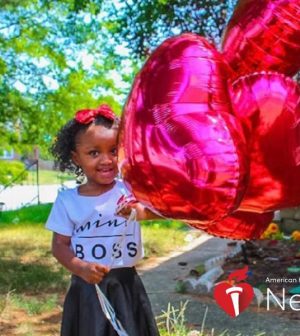- Recognizing the Signs of Hypothyroidism
- 10 Strategies to Overcome Insomnia
- Could Artificial Sweeteners Be Aging the Brain Faster?
- Techniques for Soothing Your Nervous System
- Does the Water in Your House Smell Funny? Here’s Why
- Can a Daily Dose of Apple Cider Vinegar Actually Aid Weight Loss?
- 6 Health Beverages That Can Actually Spike Your Blood Sugar
- Treatment Options for Social Anxiety Disorder
- Understanding the Connection Between Anxiety and Depression
- How Daily Prunes Can Influence Cholesterol and Inflammation
AHA News: Hoping to Find Out Her Baby’s Sex, She Learned of a Serious Heart Defect

FRIDAY, Feb. 12, 2021 (American Heart Association News) — Latisha Wilborne was excited. She and her husband had tried for a year to get pregnant, and now, 20 weeks pregnant, she was at a doctor’s visit with her two sisters where an ultrasound would determine if she was having a girl or boy. A party to celebrate the news was just days away.
The happy mood changed when the doctor told Latisha they detected a problem with the baby’s heart.
“I don’t drink. I don’t smoke. I don’t do any of those things, so how could this happen,” the 34-year-old from Baltimore said. “That’s when I was informed that 1 out of 100 babies, sometimes the heart just doesn’t form the way it’s supposed to.”
At least there was some good news: Latisha was having a girl. She would round out the family, which already included a son, Ronald, then 10.
Latisha called her husband, Derek, and sobbed. He tried to calm her down after she told him the baby might have other defects, too. He reassured her they would get all the facts and talk to the doctor together.
Meantime, they put on a brave face for the party revealing the baby’s sex. It also coincided with Latisha’s birthday party. “I was very down and sad, but it didn’t stop us,” she said.
When Latisha was eight months pregnant, doctors got a good look at the unborn baby’s heart and determined she had a severe type of congenital heart defect called tetralogy of Fallot with pulmonary atresia. Babies born with this condition have multiple defects that are treated surgically.
Around that time, talk show host Jimmy Kimmel announced that his son, Billy, was born with the same condition.
“It gave us hope that we were not the only parents out here dealing with this,” Derek said. “It gave us hope that technology has improved in such a way that our child will have a fighting chance.”
Baby Bella arrived via cesarean section on her due date, a day after her brother’s birthday so each could have their own special day. It was important to Latisha, who was born on Christmas.
Bella looked fine and had no blue coloring associated with some babies struggling with low-oxygen blood. She was crying and blowing spit bubbles. She had no other birth defects aside from her heart condition.
Bella stayed in the neonatal intensive care unit for a week, then went home. She had her first open-heart surgery at 4 months old.
Since then, Bella has had several heart catherization procedures to help improve blood flow and two more open-heart surgeries, the last in February 2020.
Now 2, Bella is an active, happy child who takes dance classes virtually because of pandemic restrictions. It’s easy to forget she has problems with her heart.
“I have to fight with myself to tell myself that even though she looks like a normal child, looks great, she still does have a heart (condition),” Derek said.
The Wilbornes help educate their community and raise awareness and about Bella’s condition by participating in the American Heart Association’s annual Heart Walk.
“I know when we first did our Heart Walk (in and around) the University of Maryland, it really showed me that this is real when I saw her picture up on the (Oriole Park at) Camden Yards big screen,” Derek said.
Latisha has written a book to help others on a similar journey. She talks about how she copes with the ups and downs of fears, anxiety, hopes and hardships.
“To all the moms out here that are going through similar situations,” she said, “I just want you to know there will be light at the end of the tunnel.”
American Heart Association News covers heart and brain health. Not all views expressed in this story reflect the official position of the American Heart Association. Copyright is owned or held by the American Heart Association, Inc., and all rights are reserved. If you have questions or comments about this story, please email editor@heart.org.
By Stefani Kopenec
Copyright © 2026 HealthDay. All rights reserved.










